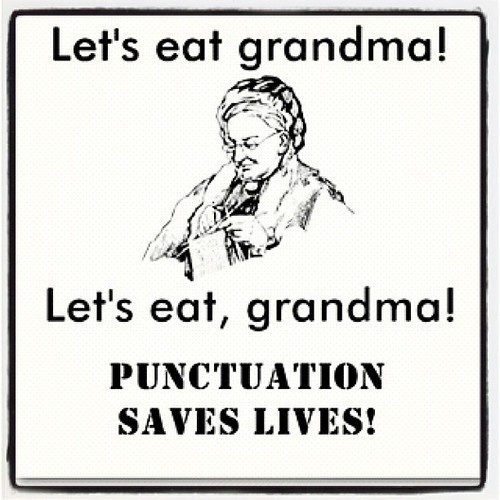In this blog post, I will be reviewing three more sections on Punctuation from Rules For Writers and then revising my draft of Project 2.
1. "The comma"
Although I expected this section to be quite basic, it was surprisingly helpful. To me, the most useful advice was, "use a comma before a coordinating conjunction joining independent clauses." (Rules For Writers, 292). The example in the book was: "the department sponsored a seminar on college survival skills, and it also hosted a barbecue for new students." (Rules For Writers, 292). I realized that when I write sentences like this, I almost always forget the comma.
After reading this section and then reviewing my own writing, I found this example from my Project 2 draft: "Her ability to appeal to the values of her audience, provide simple solutions to the clear failures of ethics, and create a strong credible foundation for herself and her argument, are the guiding forces in what makes her article so successful." The comma that is in red was not there before I revised my draft and is necessary according to the comma section.
2. "The apostrophe"
I have always had trouble knowing when and how to use apostrophes, particularly when the word that you want to show possession already ends in "s". This section was really helpful for me. The most useful advice was, "1. If the noun does not end in -s, add -'s" and "2. If the noun is singular and ends in -s or and s sound, add -'s to indicate possession." (Rules For Writers, 322). The two examples from this section were: "Lois's sister spent last year in India" and "Her article presents an overview of Marx's teachings." (Rules For Writers, 322).
After reading this section and then reviewing my own writing, I found this example from my Project 2 draft: "I will prove how Powell does this explicitly by manipulating word-choice and tone, calling attention to simple solutions of these failures, and reinforcing the audience’s rightful expectations concerning ethics in journalism by making several references to the SPJ Code of Ethics." Before, I had put the apostrophe on the outside of the s. I'm not exactly sure why I did that, but anyway, it's fixed now!
3. "End punctuation"
For this particular project, the most useful advice in this section was on "the period". The most useful advice was, "If a sentence reports a question instead of asking it directly, it should end with a period, not a question mark." (Rules For Writers, 333). The example from the book was: "The professor asked whether talk therapy was more beneficial than antidepressants?." In the example, the sentence should end with only a period.
After reading this section and then reviewing my own writing, I found this example from my Project 2 draft: "Powell poses the question of how media ethics have become worse over the last few years?." This should end with a period according to the "end punctuation" section. Instead of simply correcting this sentence in my conclusion, I completely removed it.
 |
| McLure, Darin (2011) "Punctuation Saves Lives!" via Flickr Attribution 2.0 Generic License |
Although I expected this section to be quite basic, it was surprisingly helpful. To me, the most useful advice was, "use a comma before a coordinating conjunction joining independent clauses." (Rules For Writers, 292). The example in the book was: "the department sponsored a seminar on college survival skills, and it also hosted a barbecue for new students." (Rules For Writers, 292). I realized that when I write sentences like this, I almost always forget the comma.
After reading this section and then reviewing my own writing, I found this example from my Project 2 draft: "Her ability to appeal to the values of her audience, provide simple solutions to the clear failures of ethics, and create a strong credible foundation for herself and her argument, are the guiding forces in what makes her article so successful." The comma that is in red was not there before I revised my draft and is necessary according to the comma section.
2. "The apostrophe"
I have always had trouble knowing when and how to use apostrophes, particularly when the word that you want to show possession already ends in "s". This section was really helpful for me. The most useful advice was, "1. If the noun does not end in -s, add -'s" and "2. If the noun is singular and ends in -s or and s sound, add -'s to indicate possession." (Rules For Writers, 322). The two examples from this section were: "Lois's sister spent last year in India" and "Her article presents an overview of Marx's teachings." (Rules For Writers, 322).
After reading this section and then reviewing my own writing, I found this example from my Project 2 draft: "I will prove how Powell does this explicitly by manipulating word-choice and tone, calling attention to simple solutions of these failures, and reinforcing the audience’s rightful expectations concerning ethics in journalism by making several references to the SPJ Code of Ethics." Before, I had put the apostrophe on the outside of the s. I'm not exactly sure why I did that, but anyway, it's fixed now!
3. "End punctuation"
For this particular project, the most useful advice in this section was on "the period". The most useful advice was, "If a sentence reports a question instead of asking it directly, it should end with a period, not a question mark." (Rules For Writers, 333). The example from the book was: "The professor asked whether talk therapy was more beneficial than antidepressants
After reading this section and then reviewing my own writing, I found this example from my Project 2 draft: "Powell poses the question of how media ethics have become worse over the last few years
No comments:
Post a Comment